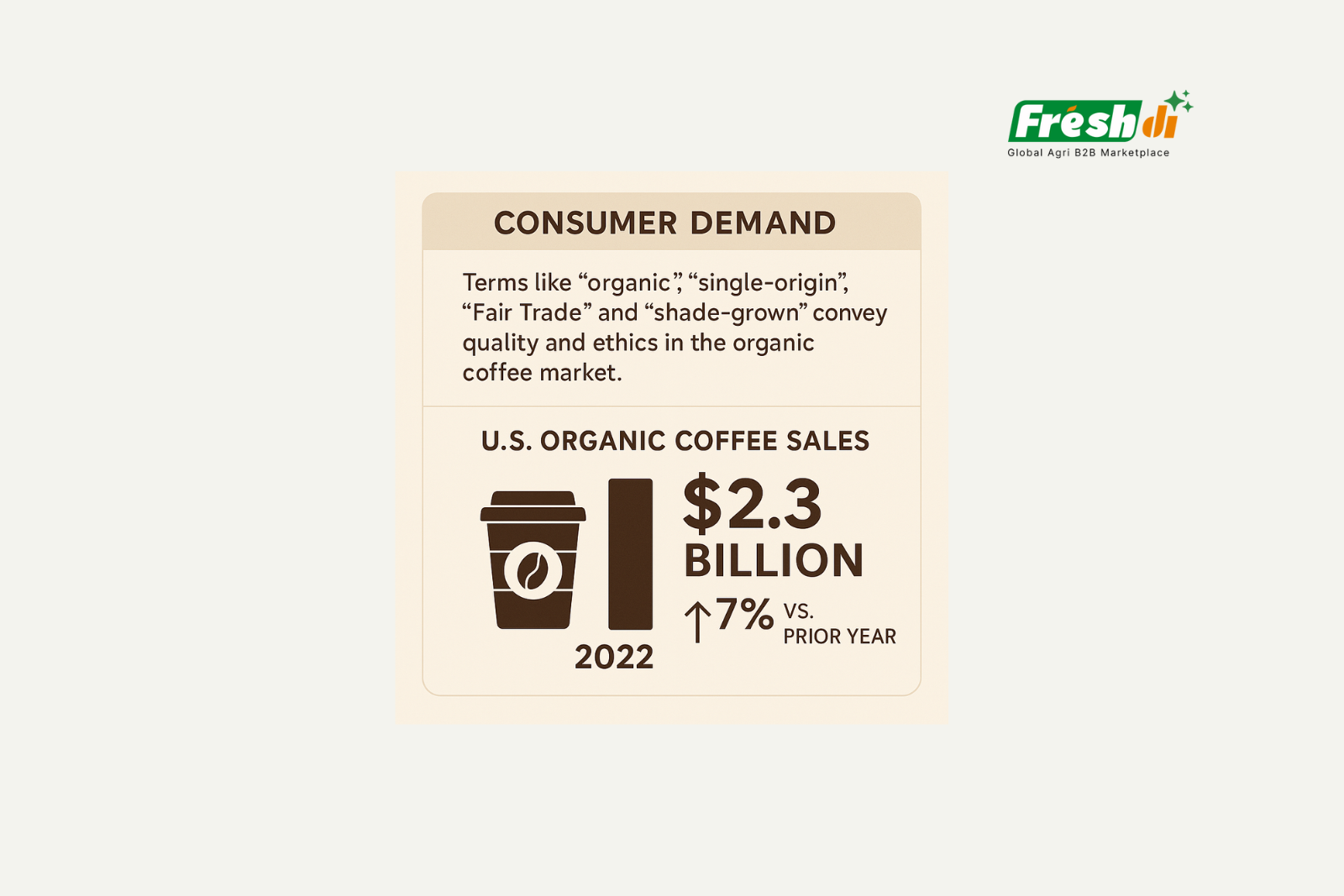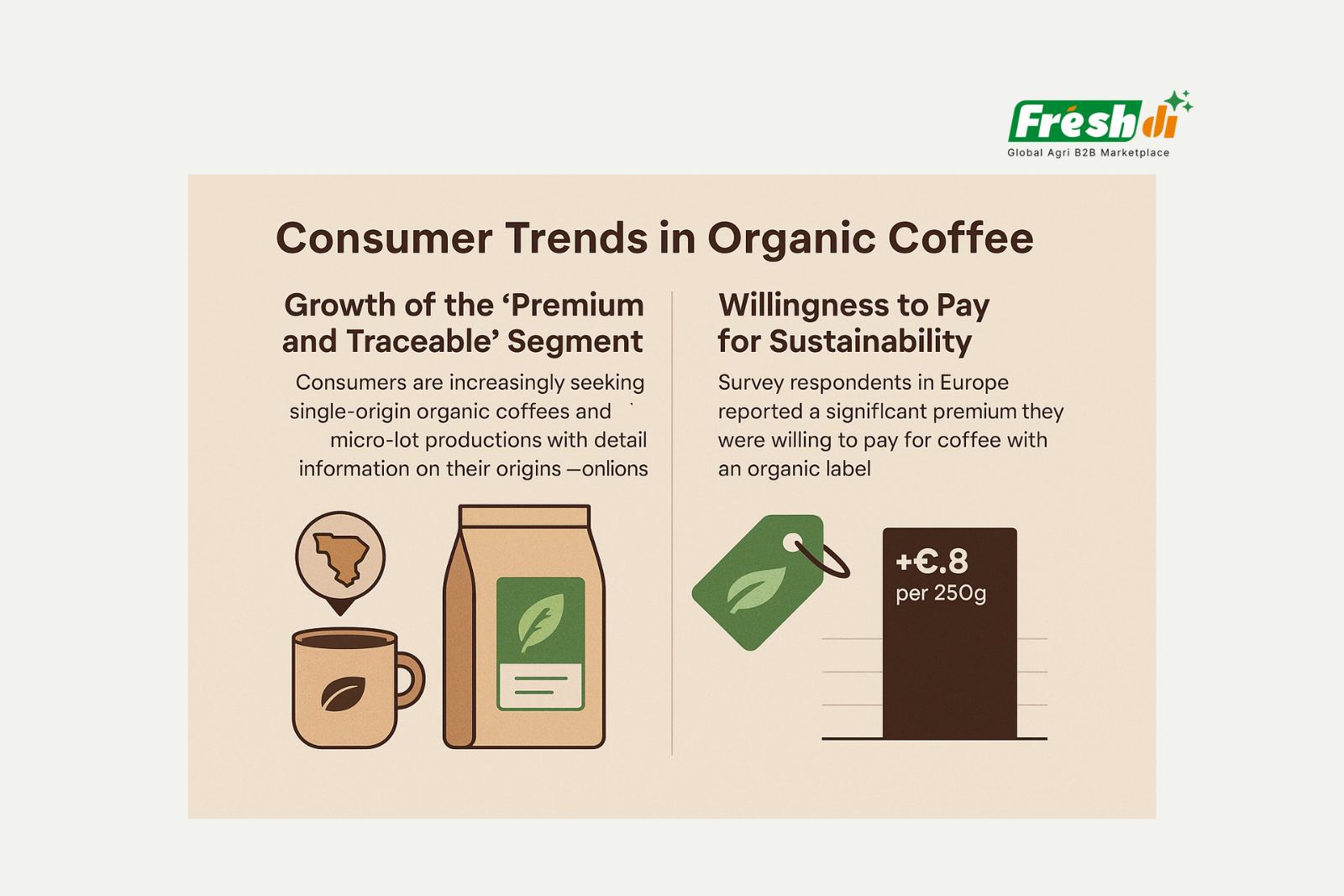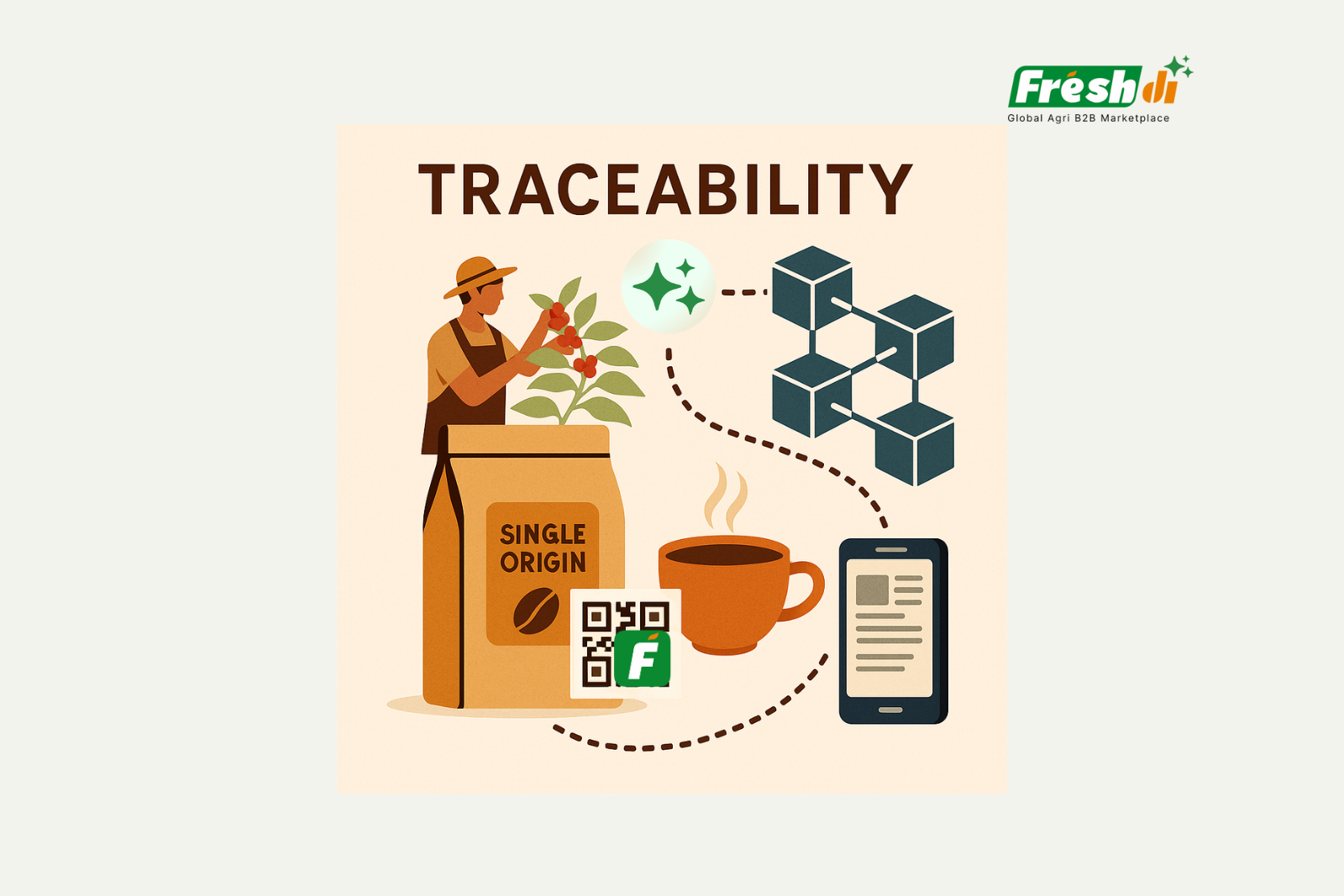Introduction
Driven by consumer health consciousness and sustainability concerns, the global organic coffee market is on track to double in value from the late 2010s to the mid-2020s. In 2018, the organic coffee market was valued around $6.8 billion, and by 2025 it is projected to exceed $12 billion. This robust growth – about 10% CAGR in recent years – signals a significant opportunity for importers, distributors, and sourcing managers.
3. Consumer Demand
On the demand side, consumer behavior is a major force propelling organic coffee’s growth. Terms like “organic,” “single-origin,” “Fair Trade,” and “shade-grown” signal quality and ethics, allowing coffee brands to charge premium prices. A striking statistic from the U.S. market: organic coffee was the best-selling organic beverage in the United States in 2022, with sales nearing $2.3 billion, up ~7% from the prior year.

One notable trend is the growth of the “premium and traceable” segment within the coffee industry. Consumers not only want organic beans free of chemicals, but also beans that tell a story – who farmed them, which region they come from, and what makes them unique. This has led to surging interest in single-origin organic coffees and micro-lot productions, which offer traceability down to a specific farm or cooperative.
Another aspect of consumer behavior is the willingness to pay more for verified sustainable products. Studies consistently show that a significant segment of coffee consumers will pay a premium for certifications like Organic, Fair Trade, or Rainforest Alliance, interpreting them as proxies for quality and responsible production. One European survey, for instance, found respondents were willing to pay an extra €2.8 per 250g for coffee with an organic label, reflecting the value placed on the organic attribute.

Premiumization in consuming markets is also evident through the rise of specialty cafes and home brewing enthusiasts. These customers often seek not just a caffeine fix, but an experience – they appreciate that an organic Ethiopia Yirgacheffe or an organic Peru Chirinos has distinct flavor notes and a clean origin story. Retailers and coffee brands respond by highlighting buzzwords like “shade-grown under native forest” or “direct trade with farmers” alongside organic certification, emphasizing both quality and ethics. In North America, for example, demand for traceable, fair-trade and organic coffee is a leading driver of growth in the premium segment.
4. Environmental and Health Benefits
Why are consumers and producers gravitating towards organic coffee? A key reason lies in its environmental and health benefits, which have become ever more important in an age of climate change and wellness awareness.
From an environmental perspective, organic coffee farming is often synonymous with sustainable agriculture. Organic standards prohibit synthetic pesticides and fertilizers, leading many organic coffee farmers to revert to traditional, eco-friendly practices. For example, organic coffee is frequently shade-grown under a canopy of trees, a practice that not only produces superior taste in many cases but also promotes forest preservation and biodiversity. In organic coffee farms, you’ll often find a thriving ecosystem: birds and insects serve as natural pest control, and the shade trees help prevent soil erosion and maintain healthy soils.


This agroforestry approach means organic coffee can be grown in harmony with the environment, as seen in places like Ethiopia’s forest coffee or Peru’s biosphere reserve projects. Studies note that such practices enhance climate resilience; by avoiding chemical fertilizers (which emit greenhouse gases) and preserving tree cover, organic coffee farms can have a lower carbon footprint and even contribute to carbon sequestration. Furthermore, the absence of agrochemicals protects local water sources from contamination – a lesson learned in regions like Marcala, Honduras, where rivers once polluted by coffee processing run clear again thanks to organic methods.
The health benefits angle is two-fold: it concerns both consumer health and farmers’ health. For consumers, while coffee itself (organic or not) is rich in antioxidants and associated with various positive health effects, organic coffee offers peace of mind that they are not ingesting residues of synthetic pesticides or fertilizers. Health-conscious buyers appreciate that organic coffee beans are processed without chemical additives, aligning with broader wellness trends.
In sum, the sustainability trifecta of organic coffee – environmental protection, social benefits, and personal health – forms a compelling story. This story is a selling point in the market: B2B buyers can confidently market organic coffee as not only a premium product, but one that is “good for the planet and good for you.” Emphasizing these benefits helps build a brand’s credibility in corporate responsibility. And in practical terms, each bag of organic coffee sourced is a contribution to reducing chemical use and encouraging biodiversity in some of the world’s most precious tropical landscapes.
5. Trust-Building via Digital Sourcing
As the organic coffee sector grows, so do the market opportunities for importers, distributors, and sourcing managers – especially those who can ensure quality and trust in their supply chain. Organic coffee drinkers pay premium prices largely because they trust the product is authentic and ethically produced. Therefore, trust-building and traceability are paramount for anyone in the B2B supply chain. In the past, establishing that trust meant frequent origin visits, paper trails of certificates, and relationships built over years. While those elements are still important, modern B2B buyers have new tools at their disposal to vet suppliers and maintain transparency: digital marketplaces and data-driven platforms like Freshdi.com.
Traceability is another area enhanced by digital tools. Some platforms are beginning to integrate blockchain or digital ledger systems to record each transaction and movement of a coffee lot. While not yet universal, the trend is clear: importers are investing in tech that can provide an end-to-end trace of coffee, from farm to roasting facility. This kind of traceability builds trust with end consumers, as coffee brands can confidently put a single-origin story or QR code on their packaging, knowing they have verified the supply chain. In B2B relationships, providing traceability data can be a differentiator that wins contracts, especially with large retailers or roasters that have strict sustainability reporting requirements.

Digital sourcing platforms make it easier to forge those partnerships. Freshdi – a global agri-food B2B marketplace – illustrates how digital sourcing can enhance trust and efficiency. The platform connects international buyers with verified suppliers in over 200 countries, focusing on agricultural products including coffee. For example, a European distributor could find a “verified supplier” cooperative in Ethiopia on Freshdi that offers organic Yirgacheffe, negotiate a deal directly that could simplify what traditionally might involve agents or month time.
Sources:
- International market data on organic coffee production and trade
- Industry analyses and reports on organic coffee market size and growth
- Freshdi Coffee Market Report Q2/2025 and platform data
- Allied Market Research and Business Research Company insights on consumer trends and health benefits
- Fair Trade USA pricing standards for organic coffee premiums
- UNESCO and USDA reports on leading organic coffee exporters and farming practices
About us
Freshdi.com is the world’s leading global B2B Marketplace for global agricultural products and food, connecting directly between buyers and suppliers by Empowering Freshdi AI. Freshdi.com has over 3M+ suppliers, 2M+ active buyers, and 1,000+ buying requests updated daily in agri-food.



